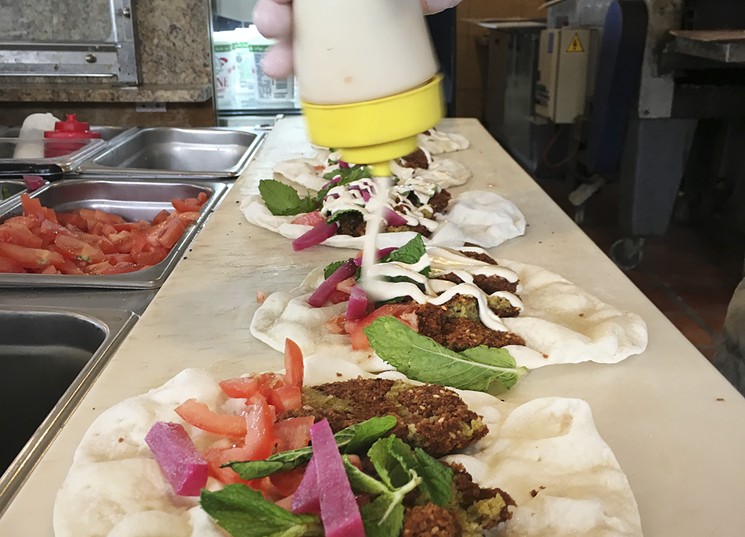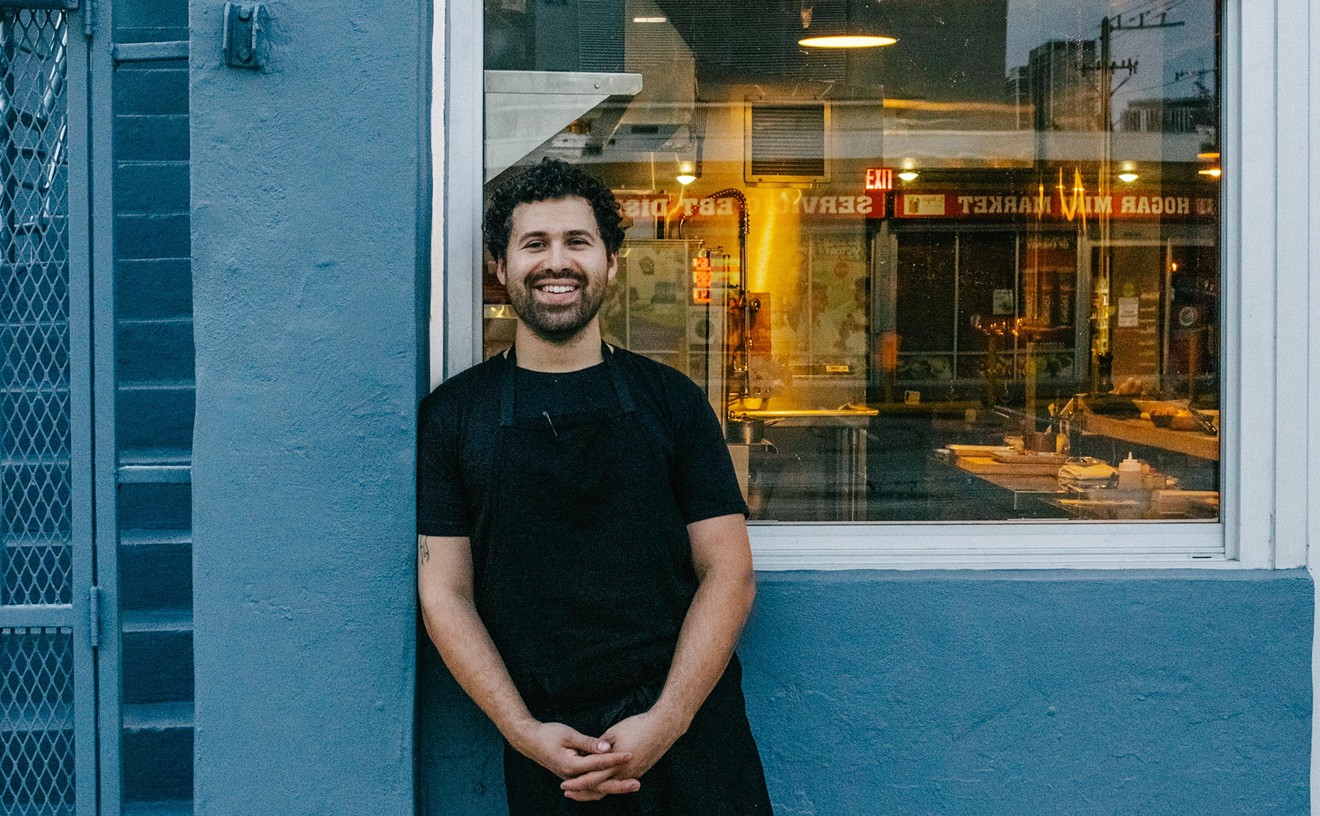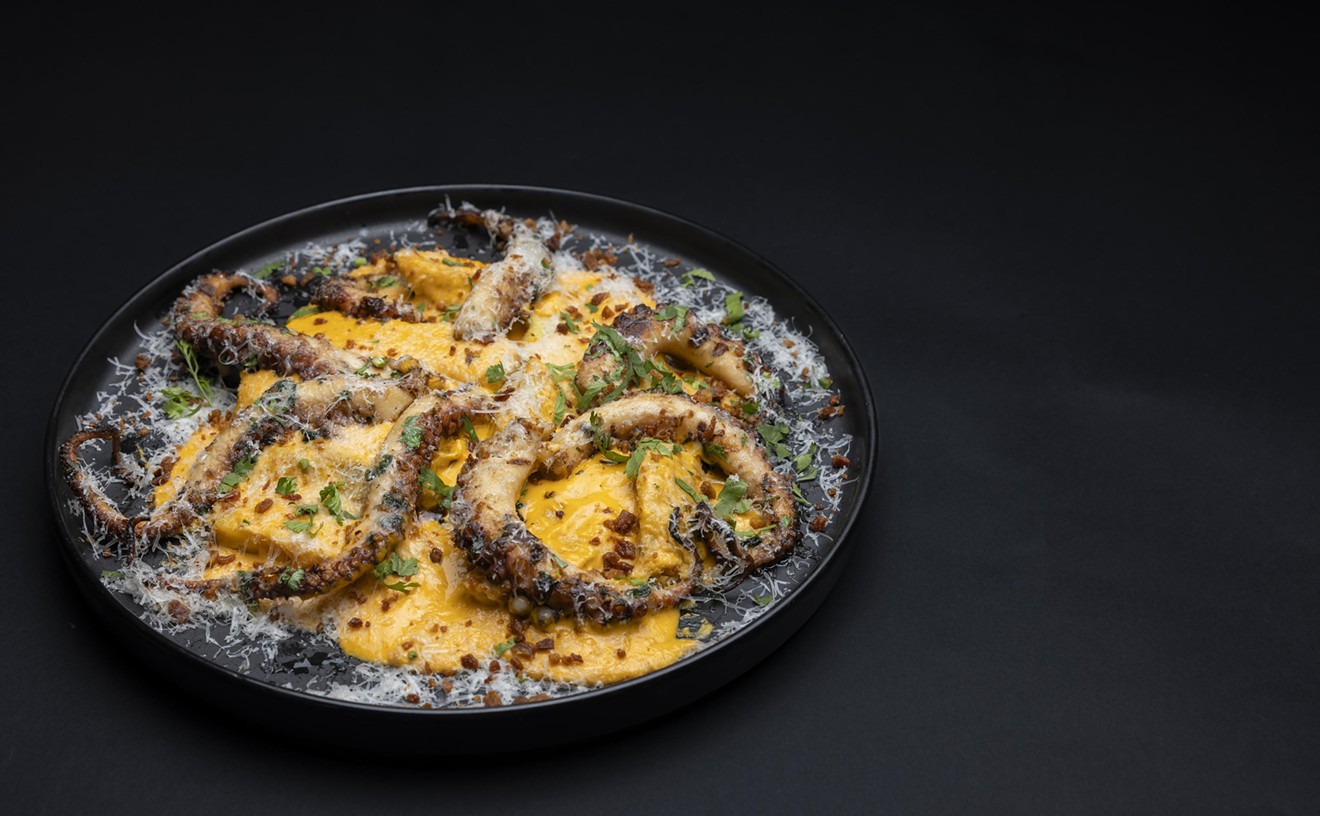It's just before 9 a.m. and Marcel Az still hasn't had breakfast. Standing on the sidewalk outside Fort Lauderdale's Noor Bakery, the slender, baby-faced trucker cups his hands around his eyes and desperately signals for help.
When the door of the beige building with a red clay-tiled roof clicks open, the 26-year-old coos "Finally," before walking inside, where the starchy fragrance of baking bread fills a room full of mismatched tables and chairs.
"A za'atar and a labneh," Az calls out.
Soon, two impossibly thin rounds of chalky white dough are slid onto a conveyor belt that rumbles through a hot oven. They emerge from the other end bubbled up and blistered. Another pass through the oven adds the smoky char marks that indicate they're ready.
Then come the toppings. For the labneh, Noor uses an intensely sour version of salted, Greek-style yogurt. It is nearly as thick as frosting, and delicious. The addition of chopped tomatoes and olives with a bouquet of whole mint leaves fills it out. The labneh becomes a sort of seasoning for the tomatoes, and the mint's freshness smooths out the yogurt's puckery tang.
Sit back and be awed by the way the juices from the meat and a sparse scattering of vegetables blend.
tweet this
Next is a thick paste filled with sesame seeds and tinted forest green with za'atar. The ubiquitous Middle Eastern spice is composed of ground thyme and sumac, giving it the aroma of fresh-cut grass and leaves. Once lathered onto a hot flatbread, each bite asserts this is one of the world's great flavor combinations.
"There's just something about the taste, the spices," says Az, who visits Noor on average three times a week. "It's the last place I stop when I'm driving out of town, and the first place I go when I get back."
When owner Jamal Saleh opened Noor, which means "light" in Arabic, in 2006, he didn't plan on becoming an evangelist for the Lebanese flatbreads he grew up eating in Beirut. Yet in doing so, he's added another delight to Broward County's astonishing assortment of ethnic restaurants, while also baking up a new life after war plagued his youth.
Saleh, who's 58 years old, has a plump, olive-hued face marked by black, caterpillar eyebrows and topped with thick salt-and-pepper hair. Born into a family with seven children, he suffered from a young age after his mother succumbed to breast cancer. All the kids – four girls and three boys – worked to help the family make ends meet. Saleh studied engineering, and by age 23 had a pilot's license. He planned to become an aeronautics engineer, and then the Lebanese civil war broke out.
The 15-year-long sectarian conflict that left an estimated 120,000 dead dashed hopes for a future in the city once called the Paris of the Middle East. "Every Lebanese lost family and friends," Saleh says. "The war also killed everybody's dreams."
Relatives helped bring him to America in 1989. He lived at first in New York City, working in grocery stores and fast food restaurants. A year in the cold was all he could bear, so he moved to South Florida, where he started working at car washes. After a few years, he cobbled together enough money to buy his own. But business was slow and every week was a struggle to survive. After one especially long, miserable summer day, he returned home to find his wife Zahra stretching dough and studding it with chunks of ground beef perfumed with cinnamon and allspice, then topped with bits of onion and tomato, before popping it into a hot oven.
"I just sat looking at that for an hour," Saleh recalls. "Then I remembered an American chef once told me, 'When you mix flour and water, you can do anything.'"
A few months later, he put down his life's savings, about $4,000, to take over and outfit the space where the bakery sits today, just north of Griffin Road and west of I-95.
Today, you can find that flatbread, meat, and spice combination at Noor. Just ask for number 13, then sit back and be awed by the way the juices from the meat and a sparse scattering of vegetables blend into a rich, slightly tangy sauce that soaks some parts of each flatbread into a sloppy delight.
The sujuk pie is just as satisfying in its simplicity. Saleh dots a melted mozzarella-veneered flatbread with a handful of this spicy, salty, auburn-colored beef sausage. Should you stop by in the morning, this same pie is offered with a scrambled egg for a mere 75 cents, bringing the total cost of a very respectable breakfast to $3.50.
Saleh insists none of the recipes are closely held secrets. They are just his family's take on the food they spent their lives eating.
"You can find this anywhere in the Middle East," he promises.
Yet it is hard to pin down exactly what Saleh's bread is. For simplicity's sake, he calls it a flatbread. As a loose category, flatbreads are among the world's oldest produced food. Archaeological evidence shows people living in the Indus Valley 3,000 to 4,000 years ago baking flatbreads similar to India's roti, according to Alan Davidson's Oxford Companion to Food. Generally speaking, flatbreads include everything from a fluffy Israeli-style pita to Aztec corn tortillas to Armenian lavash. Saleh's bread, however, doesn't fit neatly into any one category.
It's made with a simple dough of flour, sugar, and a touch of yeast. "Anyone can do it!" Saleh proclaims. The mixture is left to proof for a short time. Some days, it's 15 minutes. On others, it's an hour. "It depends on the weather," Saleh says. Just as important is the way the dough is stretched and rolled, a process that takes place in a back kitchen under heavy security. Small holes are poked into the bread just before it's baked, using what looks like a spiked paint roller.
It's worth trying one unadorned to understand how special this bread is. You have your chance when you order a falafel with puffy chickpea fritters that are mashed down, then topped with mint, tomatoes, pickled vegetables, and plump, buttery fava beans that add a layer of intense, herbaceous richness.
Also not to be overlooked is the spinach and feta. Here again, Saleh uses a different variety of a familiar ingredient, and like the labneh, the feta is likely richer, creamier, and saltier than the vast majority of such cheeses.
The menu is filled out with different combinations of each topping. A plain pie with za'atar, for example, can also be crowned with labneh and its accoutrements. Shredded chicken can be added to a spinach and feta pie. And the one with Akawi cheese, a white Palestinian variety that melts like mozzarella with the saltiness of feta, can be enjoyed by itself or with za'atar.
But Noor Bakery is a humble place. Little more than framed, gold leaf verses from the Koran and faded images of Lebanese landmarks adorn the walls. Saleh's flatbreads, or pita, or pies, or whatever they're called, may be worth sitting down to enjoy, but most people grab them to go. It is simple, nourishing food prepared fresh and sold at a reasonable price. All fast food should be like this.
Saleh makes clear this was his plan from the very beginning. But he didn't do it because it was the right thing. Noor just had to be this way.
"When you make food, you have to think about it as though your family, your kids are going to eat it," Saleh says. "Our jobs are our only security, and we had to do them right."
Noor Bakery & Deli
4691 Ravenswood Rd., Fort Lauderdale; 954-986-1944; noorbakery.net. Daily 9 a.m. to 4:30 p.m.
- Za'atar plain $1.50
- Za'atar and Akawi cheese $2.50
- Za'atar and labneh $2.75
- Labneh $2.50
- Akawi cheese $2.75
- Sujuk pie $2.75
- Egg, cheese, and sujuk $3.50
- Spinach and feta $2.75
- Meat pie $2.50
- Falafel wrap $4














